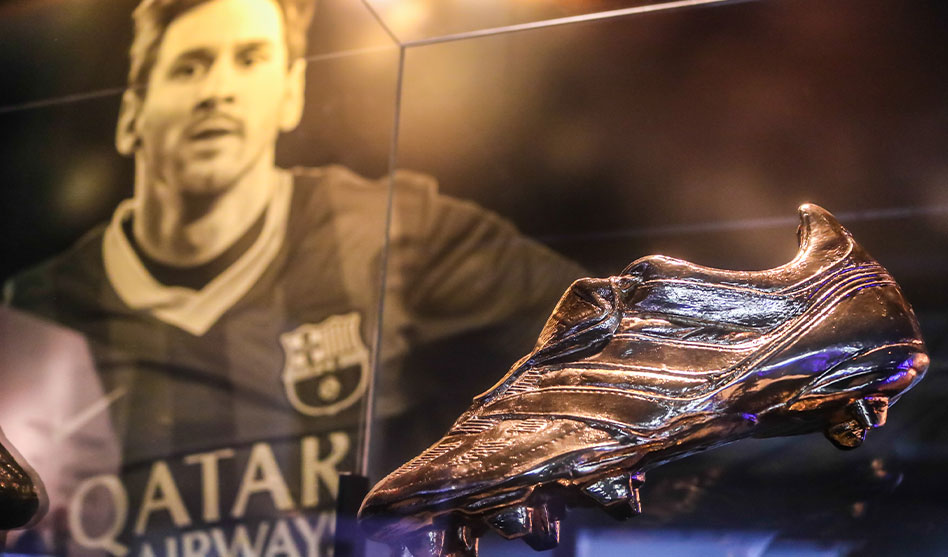The highest goal scorer in league games from the top tier of a European national league receives the European Golden Shoe, also known as the European Golden Boot, each season. A sculpture of a football boot serves as the award. The award, formerly known as the “Soulier d’Or,” which translates from French as Golden Shoe or Boot, has been granted to the highest striker in every European league during a season since its establishment in the 1967–68 campaign.
Since 1997, it has been weighted in favor of the leagues with the highest rankings. Since the 1996–97 campaign, it has been given by the European Sports Media. It was first presented by L’Équipe magazine. Six times in all, all while representing Barcelona, Lionel Messi has taken home the honor.
The prize was given to the top scorer in every European league between 1968 and 1991. No matter how strong the league the top scorer played in or how many games the player had played in, this held true. Eusébio, Gerd Müller, Dudu Georgescu, and Fernando Gomes all won the Golden Shoe twice during this time period.
L’Équipe discontinued giving out honors between 1991 and 1996 as a result of a dispute by the Cyprus FA, which argued that a Cypriot player with 40 goals should have been recognized (even if the official top scorers for the season are both listed with 19 goals).
European Sports Media has been awarding the Golden Shoe based on a points system since the 1996–97 season, allowing players in tougher leagues to win even if they score less goals than a player in a weaker league. The UEFA coefficients, which are based on each league’s clubs’ performances in European play over the preceding five seasons, are used to rank each league, which in turn determines the weightings.
A factor of two is applied to goals scored in the top five leagues, a factor of 1.5 is applied to goals scored in leagues ranked sixth to twenty-two (formerly nine to twenty-one), and a factor of one is applied to goals scored in leagues ranked twenty-two and below.
Thus, goals scored in leagues with higher rankings will count for more than goals scored in leagues with lower rankings. Since the shift, only two winners—Henrik Larsson of the 2000–01 Scottish Premier League and Mario Jardel of the 1998–99 and 2001–02 Primeira Ligas—have not competed in one of the top five divisions.
Previously, the Golden Shoe could be shared by several players, but starting with the 2019–20 season, if there is a tie in points, the award will go to the player who played the fewest minutes. If a tie still exists, the number of league assists and subsequent least amount of penalties would be taken into account. The prize would only be split if the tie ultimately holds.
With six total victories, Lionel Messi holds the record for most awards won. He is also the record holder for the most goals and points in a season (50 and 100 respectively, in 2011–12).
Only Lionel Messi, who has won it six times while playing for Barcelona, has done so. With 50 goals scored in 2011–12, he also holds the record for most goals in a single season. This resulted in a record 100 points. Gerd Müller of Bayern Munich was the first athlete to receive the honor twice, in 1969–70 and 1971–72. Messi was the first player to get the honor three times, and he was also the first and sole recipient of the honor five and six times, respectively. Only Messi (2016–17, 2017–18, and 2018–19) has taken home the honor three times in a row.
In addition to Ally McCoist (1991–1992 and 1993–1993), Thierry Henry (2003–04 and 2004–05), Messi (2011–12 and 2012–13; 2016–17, 2017–18, and 2018–19), Cristiano Ronaldo (2013–14 and 2014–15), Robert Lewandowski (2020–21 and 2021-22), and Cristiano Ronaldo have all won the prize back-to-back years. The only players to have won the accolade with multiple teams are Diego Forlán (Villarreal and Atlético Madrid), Luis Suárez (Liverpool and Barcelona), Mário Jardel (Porto and Sporting CP), and Ronaldo (Manchester United and Real Madrid). Only Ronaldo and Suárez have won the prize while competing in both the Premier League and La Liga, making them the only players to have done so.
Additional Trivia
The inaugural recipient of the award was Eusébio in 1968. The first ever Golden Boot!
The first athlete to get the honor twice was Gerd Müller, who did so in 1970 and 1972.











